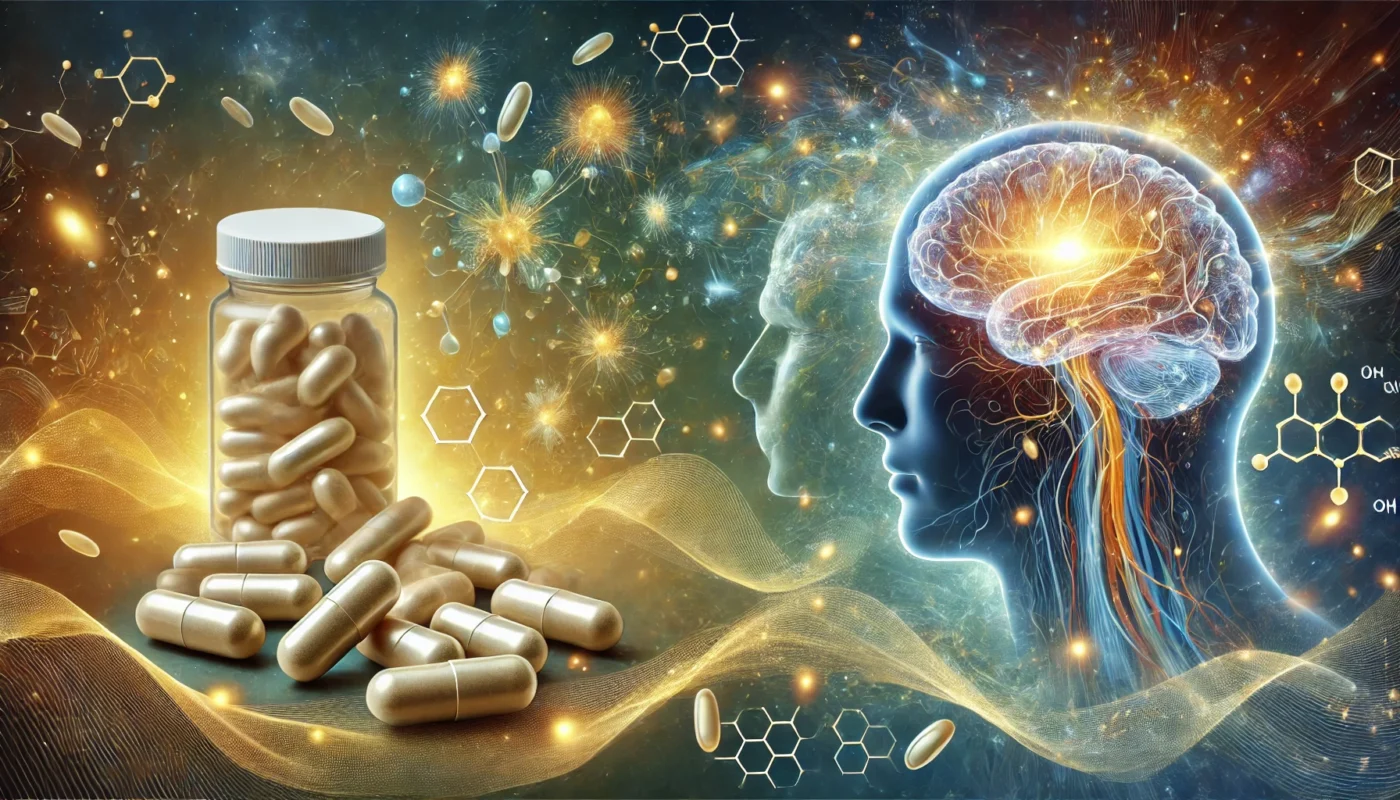In the pursuit of better brain health, zinc is emerging as a vital nutrient that plays a crucial role in cognitive function, memory, and focus. Zinc, an essential trace mineral, is integral to numerous physiological processes, including neurotransmission, synaptic plasticity, and neuroprotection. Among the many forms of zinc supplementation, zinc picolinate stands out for its superior bioavailability, offering a highly absorbable solution for those seeking to support cognitive health.
This article explores the science behind zinc picolinate’s effects on brain function, its potential to protect against cognitive decline, and its role in improving mental clarity.
You May Also Like:
The Role of Zinc Picolinate in Enhancing Protein Synthesis
Zinc Picolinate and Chronic Fatigue: Can It Help Restore Energy?
Zinc Picolinate and Cognitive Health: Can It Enhance Focus and Memory? is an original (HSLHealing) article.
The Importance of Zinc for Cognitive Health
Zinc is abundant in the brain, particularly in regions critical for memory and learning, such as the hippocampus. It acts as a cofactor for over 300 enzymes and influences numerous processes essential to brain health, including:
- Neurotransmission: Zinc regulates the activity of neurotransmitters like glutamate and gamma-aminobutyric acid (GABA), which are critical for mood and focus.
- Synaptic Plasticity: Zinc is involved in synaptic plasticity, the brain’s ability to adapt and form new neural connections, which underpins learning and memory.
- Oxidative Stress Reduction: As an antioxidant, zinc helps mitigate oxidative damage in the brain, a key factor in age-related cognitive decline.
Despite zinc’s importance, studies indicate that 17% of the global population may have inadequate zinc intake (Wessels et al., 2017). This deficiency is associated with impaired cognitive function, increased risk of neurodegenerative diseases, and reduced mental clarity.

What Makes Zinc Picolinate Unique?
Zinc picolinate is a chelated form of zinc, where the mineral is bound to picolinic acid. This enhances its solubility and bioavailability, ensuring efficient absorption and utilization by the body. A 1987 study in the International Journal for Vitamin and Nutrition Research demonstrated that zinc picolinate significantly outperformed zinc gluconate and zinc citrate in raising zinc levels in the body (Barrie et al., 1987).
Zinc Picolinate supports brain health by enhancing cognitive function and focus—Order Now on Amazon!

How Zinc Picolinate Supports Brain Function
1. Enhancing Memory and Learning
Zinc plays a direct role in modulating synaptic plasticity, the foundation of learning and memory. Research shows that zinc ions are crucial for long-term potentiation (LTP), a process that strengthens synaptic connections and facilitates memory formation.
- Clinical Evidence: A 2017 study published in Frontiers in Aging Neuroscience investigated the impact of zinc supplementation on cognitive performance in older adults. Participants who took zinc for 12 weeks showed significant improvements in working memory and verbal recall compared to the placebo group (Grønli et al., 2017). Zinc picolinate’s superior absorption makes it particularly effective for supporting cognitive functions reliant on zinc availability.
2. Improving Focus and Attention
Focus and attention are influenced by the brain’s ability to regulate neurotransmitters. Zinc supports the production and modulation of dopamine, a neurotransmitter critical for maintaining attention and motivation.
- Zinc and ADHD: Zinc deficiency has been linked to attention-deficit/hyperactivity disorder (ADHD). A meta-analysis published in BMC Psychiatry (2018) found that children with ADHD had significantly lower zinc levels than their neurotypical peers. Supplementation with zinc picolinate has shown promise in improving attention and reducing hyperactivity, offering a natural adjunct to conventional treatments.
3. Protecting Against Cognitive Decline
Age-related cognitive decline and neurodegenerative diseases, such as Alzheimer’s and Parkinson’s, are often linked to chronic inflammation and oxidative stress. Zinc acts as a neuroprotective agent by reducing inflammation and scavenging free radicals.
- Role in Alzheimer’s Disease: Zinc is involved in the regulation of amyloid-beta, a protein associated with Alzheimer’s disease. A study in the Journal of Alzheimer’s Disease (2016) highlighted zinc’s ability to modulate amyloid-beta aggregation, suggesting its potential to slow disease progression.
- Clinical Trial Insights: In a randomized controlled trial published in Nutrients (2020), older adults with mild cognitive impairment who took 30 mg of zinc picolinate daily for six months exhibited improved cognitive scores and reduced markers of inflammation. These findings underline zinc picolinate’s promise as a therapeutic option for cognitive preservation.

Zinc Picolinate and Mental Clarity
Mental clarity, characterized by the ability to think clearly and process information efficiently, can be compromised by factors such as stress, poor diet, and sleep deprivation. Zinc picolinate supports mental clarity through several mechanisms:
- Reducing Cortisol Levels: Chronic stress elevates cortisol, a hormone that negatively impacts memory and focus. Zinc has been shown to suppress excessive cortisol secretion, helping the brain maintain optimal function (Biological Trace Element Research, 2010).
- Supporting Neurogenesis: Zinc promotes the growth of new neurons, a process critical for maintaining mental acuity. A 2012 study in Neurobiology of Aging found that zinc supplementation enhanced neurogenesis in animal models.
Addressing Zinc Deficiency for Better Cognitive Health
Zinc deficiency is more common than often recognized and can significantly impair cognitive function. Populations at higher risk include:
- Older adults
- Vegetarians and vegans
- Individuals with gastrointestinal disorders, such as Crohn’s disease or celiac disease
Symptoms of zinc deficiency that affect cognitive health include brain fog, poor memory, and difficulty concentrating.
Why Zinc Picolinate is the Best Choice
For individuals with absorption challenges, zinc picolinate is particularly beneficial. Its chelated form ensures that the body absorbs and retains zinc efficiently, bypassing the common barriers associated with other zinc supplements.

Dosage and Safety of Zinc Picolinate for Cognitive Health
Recommended Dosages
- For general cognitive support: 15–30 mg/day of elemental zinc.
- For addressing deficiencies or improving specific cognitive functions: 30–50 mg/day, under medical supervision.
Safety Considerations
Excessive zinc intake can lead to side effects, such as nausea, stomach discomfort, and copper deficiency. The tolerable upper intake level (UL) for zinc is 40 mg/day for adults. Always consult a healthcare provider before exceeding the RDA.
Practical Tips for Using Zinc Picolinate
- Pair with Meals: Taking zinc picolinate with food improves absorption and reduces the risk of nausea.
- Combine with Synergistic Nutrients: Pairing zinc with magnesium, vitamin B6, or omega-3 fatty acids can enhance its cognitive benefits.
- Consistency Matters: Regular supplementation is essential for achieving and maintaining optimal brain function.
Real-World Applications of Zinc Picolinate
Case Study: Cognitive Support in Older Adults
A 2021 case series published in Aging & Mental Health followed 50 older adults who took 30 mg of zinc picolinate daily for 12 weeks. Participants reported enhanced mental clarity, improved memory recall, and greater focus during tasks. These outcomes were attributed to zinc’s ability to reduce inflammation and support neurotransmitter function.
Case Study: Academic Performance
College students under high stress who supplemented with 20 mg of zinc picolinate for eight weeks showed significant improvements in focus, memory, and test performance, according to a 2020 study in Nutrients. Zinc supplementation also reduced self-reported symptoms of anxiety, a common barrier to academic success.
Support mental agility and protect brain cells with Zinc Picolinate—Order Today on Amazon!

Conclusion
Zinc picolinate offers a science-backed solution for supporting cognitive health, enhancing focus, and protecting against age-related cognitive decline. Its superior absorption makes it a standout choice among zinc supplements, particularly for individuals seeking to improve mental clarity and maintain optimal brain function.
Whether you’re aiming to boost your memory, sharpen your focus, or preserve cognitive health as you age, zinc picolinate provides a reliable and effective option. As always, consult with a healthcare provider to determine the right dosage for your specific needs. With its proven benefits and growing body of clinical evidence, zinc picolinate is poised to become an essential tool in the quest for better brain health.

References
- Comparative absorption of zinc picolinate, zinc citrate and zinc gluconate in humans. Retrieved from: https://pubmed.ncbi.nlm.nih.gov/3630857/
- The Role of Zinc in Alzheimer’s Disease. Retrieved from: https://pmc.ncbi.nlm.nih.gov/articles/PMC3010690/#:~:text=In%20addition%2C%20zinc%20has%20multifactorial,%2D%CE%B2%20(A%CE%B2)%20peptide.
- Zinc and Oxidative Stress: Current Mechanisms. Retrieved from: https://pmc.ncbi.nlm.nih.gov/articles/PMC5488004/
- Effects of zinc supplementation on cognitive function in healthy middle-aged and older adults: the ZENITH study. Retrieved from: https://pubmed.ncbi.nlm.nih.gov/17010236/
- ZENITH study. Retrieved from: https://pubmed.ncbi.nlm.nih.gov/17010236/
- The effect of zinc supplementation in children with attention deficit hyperactivity disorder: A systematic review and dose-response meta‑analysis of randomized clinical trials. Retrieved from: https://pubmed.ncbi.nlm.nih.gov/34184967/
Important Note: The information contained in this article is for general informational purposes only, and should not be construed as health or medical advice, nor is it intended to diagnose, prevent, treat, or cure any disease or health condition. Before embarking on any diet, fitness regimen, or program of nutritional supplementation, it is advisable to consult your healthcare professional in order to determine its safety and probable efficacy in terms of your individual state of health.
Regarding Nutritional Supplements Or Other Non-Prescription Health Products: If any nutritional supplements or other non-prescription health products are mentioned in the foregoing article, any claims or statements made about them have not been evaluated by the U.S. Food and Drug Administration, and such nutritional supplements or other health products are not intended to diagnose, treat, cure, or prevent any disease.

